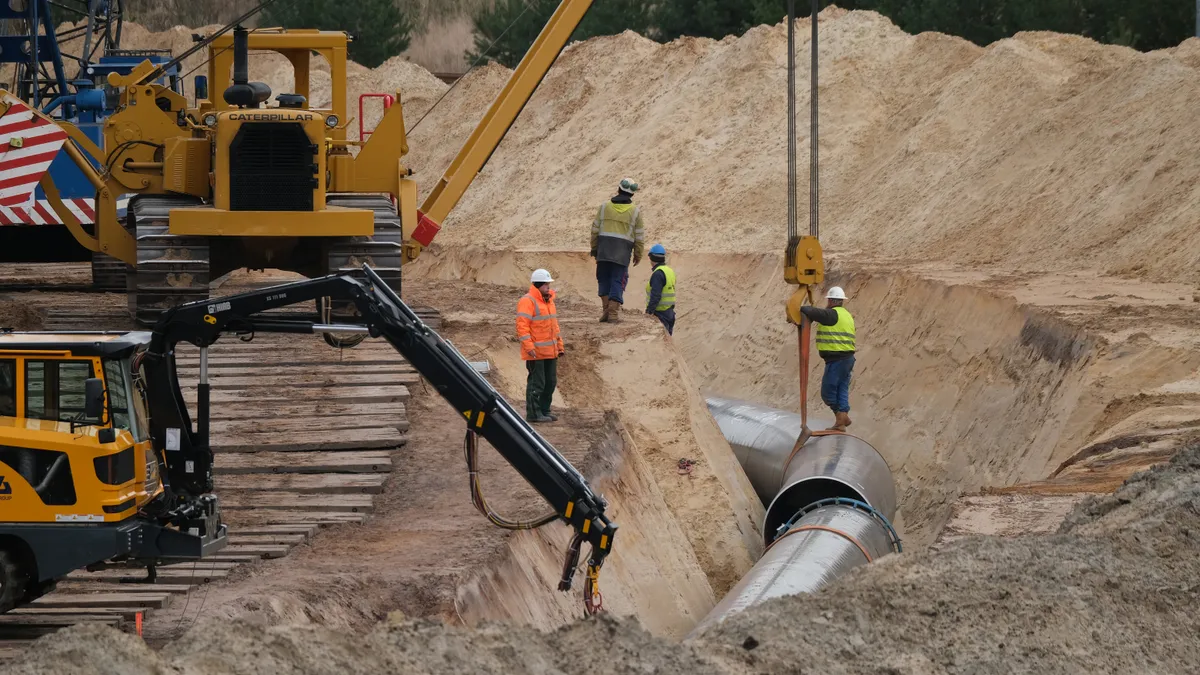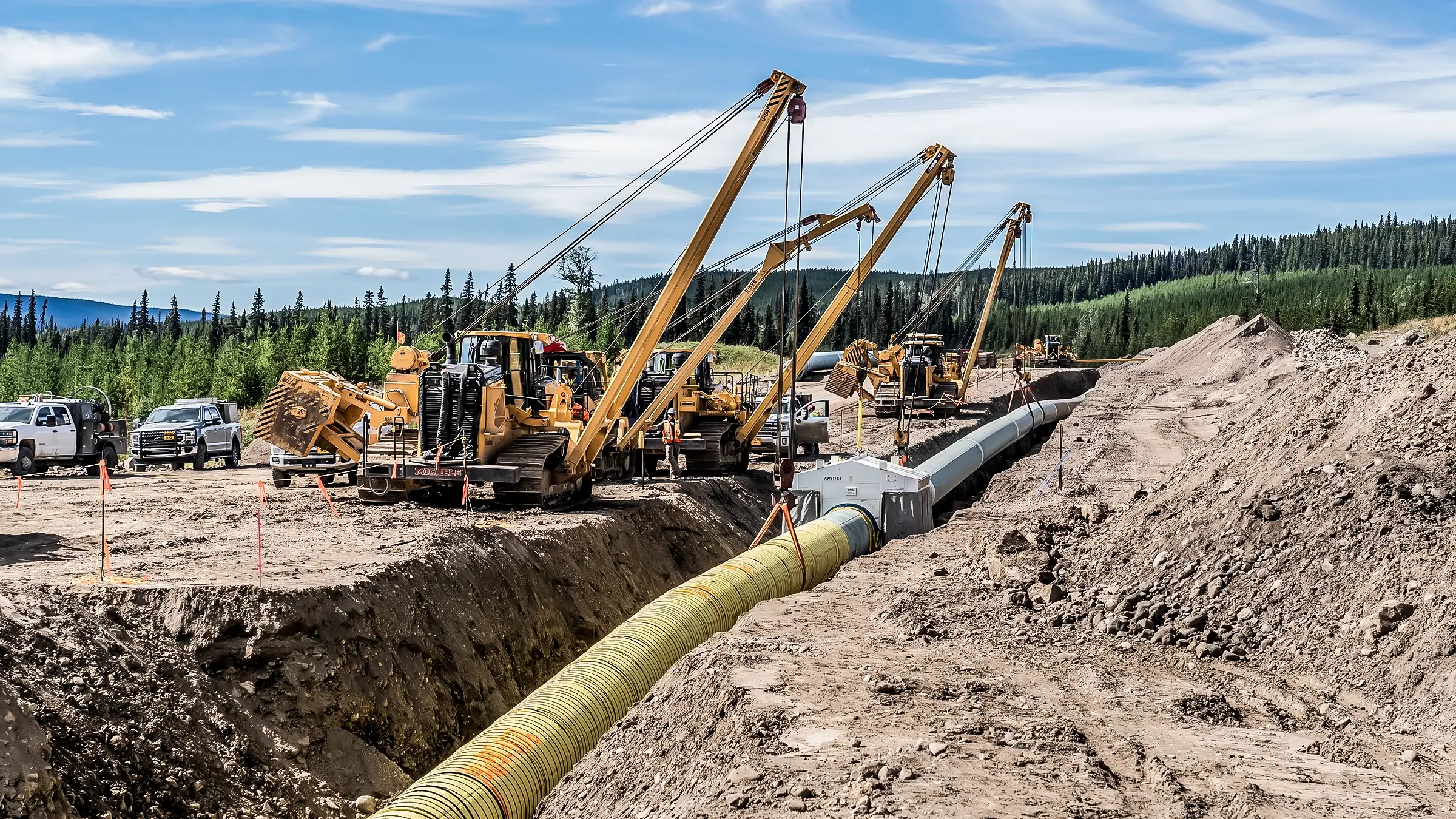Creek Pipe local contractor: How they integrate IoT in pipeline safety
Wiki Article
Understanding the Secret Attributes of Pipeline Services and Their Effect On Efficiency
Pipeline services play a crucial function in different industries, influencing operational effectiveness noticeably. Trick features, such as sophisticated tracking innovations and upkeep methods, are crucial for minimizing downtime. In addition, governing conformity guarantees safety and security and environmental security. However, the interaction between style, infrastructure, and financial aspects can make complex these procedures. Recognizing how these components impact total efficiency raises crucial questions concerning finest techniques and future growths in the area.The Role of Modern Technology in Pipeline Monitoring
As developments in modern technology remain to advance, the value of effective pipe tracking has actually come to be increasingly obvious. Modern pipe systems rely upon advanced tracking tools that enhance operational performance and security. Technologies such as real-time information analytics, sensing units, and drones offer drivers with immediate insights right into pipe conditions, enabling them to find leaks, deterioration, and various other prospective issues prior to they escalate right into considerable problems.Additionally, the combination of Net of Things (IoT) devices has changed traditional tracking methods, allowing for constant surveillance and automated coverage. This proactive approach not only lessens risks yet likewise optimizes maintenance schedules and source allocation. Additionally, progressed software platforms help with information visualization and interpretation, equipping decision-makers to respond promptly to abnormalities. Jointly, these technical developments not only enhance pipe honesty however also foster ecological stewardship by minimizing the possible impact of leakages and spills.
Upkeep Techniques for Improved Efficiency
Effective maintenance strategies are vital for enhancing pipe efficiency. Implementing predictive upkeep strategies, adhering to routine evaluation protocols, and developing robust emergency situation feedback plans can significantly improve functional integrity. These approaches not just decrease downtime yet also contribute to the total security and integrity of pipe systems.Anticipating Upkeep Methods
Anticipating upkeep strategies are significantly identified for their capacity to enhance functional performance in pipe solutions. By leveraging data analytics and keeping an eye on technologies, these methods enable operators to prepare for devices failings prior to they happen. This proactive method reduces unintended downtime, minimizes maintenance costs, and expands the lifespan of vital properties. Sensing units and IoT gadgets play a pivotal function in collecting real-time data, permitting the analysis of devices wellness and performance patterns. Artificial intelligence algorithms analyze this data to determine patterns and anticipate potential problems. Pipeline operators can arrange maintenance tasks throughout non-peak times, maximizing source allotment and guaranteeing continuous operation. Ultimately, the adoption of predictive maintenance promotes an extra trusted and reliable pipe facilities.
Routine Evaluation Protocols
Regular evaluation methods serve as a foundation of upkeep strategies focused on boosting efficiency in pipeline procedures - Creek Pipe Midland TX. These procedures entail organized assessments of pipeline honesty, concentrating on spotting possible concerns before they rise. Regular evaluations generally include aesthetic analyses, leak discovery technologies, and pressure tracking to assure peak efficiency. By adhering to recognized routines, drivers can determine corrosion, product wear, or blockage, thus decreasing downtime and repair service prices. Additionally, data gathered throughout evaluations can educate anticipating maintenance efforts, permitting an aggressive method to pipe management. Eventually, regular examinations not just prolong the lifespan of pipe facilities yet additionally add to much safer and more trustworthy transportation of sources, reinforcing total operational efficiencyEmergency Situation Action Planning
Emergency situation feedback planning is necessary for maintaining efficiency in pipe operations, making certain that drivers are prepared to resolve unexpected cases quickly and properly. A well-structured emergency situation action strategy consists of clear protocols, designated duties, and interaction techniques to minimize risks related to pipeline failings. Routine drills and training boost group readiness and acquaint personnel with emergency situation procedures. In addition, having conveniently offered sources, such as spill control devices and emergency situation get in touch with listings, can significantly decrease response times. By incorporating real-time surveillance technologies, drivers can swiftly identify and react to concerns, lessening ecological influence and functional downtime. Inevitably, a complete emergency feedback strategy not only safeguards assets and employees yet also reinforces the total performance of pipeline services.Regulatory Compliance and Security Requirements
Regulative compliance and safety criteria play an important duty in the pipe services sector. Creek Pipe local contractor. Sticking to sector policies ensures that business execute efficient safety and security procedures and take the chance of monitoring techniques. This dedication not just protects workers and the atmosphere however additionally boosts overall functional efficiencyConformity With Market Rules
Conformity with sector guidelines is crucial for guaranteeing the safety and security and efficiency of pipeline procedures. Governing structures, such as those established by the Epa (EPA) and the Pipeline and Hazardous Materials Security Management (PHMSA), established stringent criteria that operators need to stick to. These laws cover different facets, consisting of pipeline design, building, upkeep, and tracking, guaranteeing that systems run safely and effectively. Non-compliance can cause extreme fines, operational delays, and ecological hazards. By adhering to these policies, pipe firms not just shield public safety and the setting but likewise boost their functional performance. Eventually, regulative compliance promotes depend on amongst stakeholders, making sure that pipeline services can operate perfectly in an affordable landscape while meeting lawful obligations.
Safety Protocol Execution
Effective safety method implementation is an essential component of pipe operations, closely linked to governing compliance and safety and security criteria. Abiding by these procedures not only ensures the protection of personnel yet also safeguards the atmosphere and framework. A durable security structure consists of regular training, comprehensive evaluations, and the usage of proper safety and security tools. Organizations needs to remain attentive in upgrading their protocols to reflect adjustments in guidelines and technological innovations. Compliance with recognized security standards lessens the risk of crashes and improves operational effectiveness. Furthermore, a culture of safety and security cultivates worker involvement and accountability, adding to general organizational success. Eventually, effective security method execution is vital in maintaining the stability of pipeline services and accomplishing lasting sustainability in procedures.Danger Monitoring Strategies
Implementing robust danger administration techniques is essential for guaranteeing that pipeline procedures adhere to governing requirements and security requirements. Organizations must recognize potential risks and assess threats associated with pipe activities. This entails conducting extensive assessments, using innovative monitoring innovations, and preserving conformity with sector guidelines. Routine training for employees on safety and security protocols these details enhances situational understanding and prepares groups to respond successfully to emergency situations. Additionally, creating backup plans and carrying out drills can significantly alleviate dangers. Working together with regulative bodies ensures placement with progressing security requirements. By focusing on risk management, pipe services can improve operational efficiency while safeguarding both the atmosphere and public security. Inevitably, a proactive strategy to take the chance of management cultivates a society of safety within the sector.Pipeline Style and Infrastructure Considerations
Exactly how can the style and infrastructure of pipelines affect general operational effectiveness? The arrangement of pipes plays an essential duty in determining their effectiveness. Reliable style decreases rubbing losses, therefore lowering energy consumption during liquid transport. Elements such as size, material selection, and layout straight effect circulation prices and maintenance demands.In addition, tactical positioning of shutoffs and keeping track of systems enhances functional control and safety and security. Creek Pipe local contractor. Infrastructure factors to consider, including accessibility for upkeep and fixing, significantly affect downtime and overall productivity
Moreover, integrating sophisticated modern technology for real-time surveillance facilitates prompt discovery of leakages or ineffectiveness, making sure quick feedbacks to issues. The overall structural stability, affected by material sturdiness and ecological aspects, additionally forms Your Domain Name long-term operational success. Consequently, thoughtful style and durable infrastructure are necessary for making the most of pipeline efficiency, ultimately adding to the integrity and success of pipeline services.
Environmental Influence and Sustainability Practices
While the need for pipe solutions remains to expand, understanding the environmental impact and adopting sustainability methods has actually become increasingly important. The building and procedure of pipes can especially influence ecosystems, wild animals habitats, and water resources. To alleviate these impacts, companies are implementing innovative modern technologies and techniques focused on reducing emissions, protecting against spills, and minimizing land interruption.
Sustainability efforts usually include using ecologically pleasant products, boosting power performance, and employing eco-friendly power sources to power operations. In addition, business are significantly carrying out thorough environmental analyses before project initiation, guaranteeing conformity with guidelines and stakeholder interaction.

Expense Monitoring and Economic Variables in Pipeline Providers
As the pipe industry expands, effective cost administration and comprehending financial variables come to be vital for maintaining competition. Firms face various economic stress, consisting of varying product prices, labor expenditures, and regulative conformity charges. To navigate these challenges, pipe solution carriers have to embrace calculated monetary planning and budgeting techniques.Buying innovation can enhance functional performance, eventually minimizing expenses over time. In addition, efficient task monitoring assurances that sources are designated efficiently, minimizing hold-ups and unforeseen costs.

Market problems, such as demand for energy and geopolitical aspects, additionally influence financial stability. Firms should remain nimble, readjusting their methods in reaction to these exterior factors.
Regularly Asked Questions
What Are the Different Kinds Of Pipeline Services Available?
Numerous kinds of pipe solutions include transportation, storage, upkeep, inspection, and repair. Each service plays an essential function in making sure the seamless activity of products, improving safety and security, and lessening operational disruptions across various sectors.Just How Frequently Should Pipeline Inspections Be Carried Out?
Pipeline assessments ought to be performed consistently, usually each to three years, relying on the kind and condition of the pipe. More constant explanation assessments may be needed for older or risky pipelines to ensure security and stability.
What Are the Key Causes of Pipeline Failings?
The major reasons for pipeline failures include rust, faulty building and construction, material issues, external damage, leakages, and functional errors. Each variable adds substantially to potential threats, highlighting the significance of regular upkeep and tracking for safety and security.How Can Firms Enhance Pipeline Solution Integrity?
Business can boost pipe service reliability by implementing normal maintenance timetables, making use of innovative tracking innovations, performing thorough inspections, buying staff member training, and embracing aggressive threat monitoring methods to expect and minimize possible failures.What Duty Do Operators Play in Pipeline Providers?
Operators play an important role in pipe services by making certain secure transportation, maintaining equipment, keeping an eye on system honesty, collaborating upkeep, and reacting to emergency situations. Their competence directly influences functional effectiveness and minimizes interruptions in service delivery.Report this wiki page